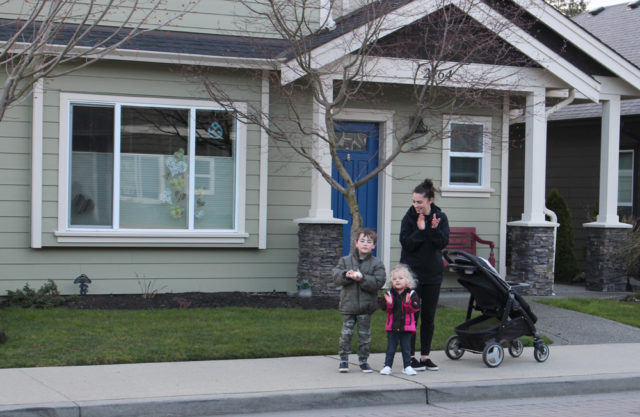
Friday May 1, 2020 ~ VICTORIA, BC
by Mary Brooke, B.Sc. ~ West Shore Voice News
BC is now 101 days into the COVID-19 pandemic, and the 7 pm clapping for frontline health care workers continues every evening.
Hearts in windows, thank you’s in lots of virtual ways through social media — the gratitude is real.
Through the combined commitment of the health care workers and the overall population, British Columbians appear to have flattened the curve enough that next week some phase-one measures of the new normal will be unveiled by the Premier, Minister of Health and Provincial Health Officer.
COVID-19 stats in BC at May 1:
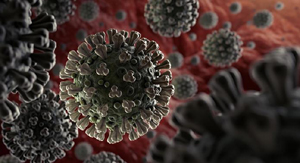
With 33 new cases today (bringing the total of test-positive cases to 2,145) and 112 deaths to date (that’s one more in the last 24 hours), BC continues to show containment of COVID-19 infection in the general population. Cluster outbreaks have occured in 24 long-term care homes (21 currently), raw meat processing plants, and a prison setting.
With 33 new cases today (bringing the total of test-positive cases to 2,145) and 112 deaths to date (that’s one more in the last 24 hours), BC continues to show containment of COVID-19 infection in the general population. Cluster outbreaks have occured in 24 long-term care homes (21 currently), raw meat processing plants, and a prison setting.
There are presently 79 people in hospital with COVID-19 infection, and of those 24 are in acute care (ICU).
As of today May 1, there are 1,357 people who previously tested positive for COVID-19 in BC who have now recovered.
The distribution of the 1,245 test-positive cases in the five health authorities of BC shows higher numbers in more densely populated areas (but which also happen to be the locations of the outbreaks in conditions of close-quarters like long-term care, meat-processing, and prison): Vancouver Coastal Health 823, Fraser Health 978, Island Health 121, Interior Health 174, and Northern Health 49.
Getting to the new normal, step by step:
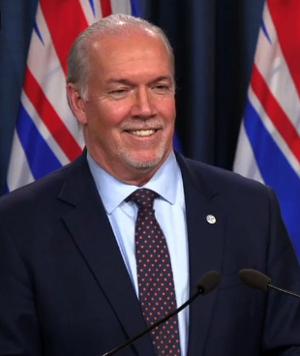
The process of getting started with the ‘new normal’ — as announced earlier this week by Premier John Horgan — will begin next week. One by one, or in small clusters, Provincial Health Officer Dr Bonnie Henry will identify sectors that can go first or be next. She says she will welcome input from various sectors on how her broad guidelines might be implemented.
BC is still in a State of Emergency for two more weeks, as announced yesterday by Premier Horgan.
First steps toward the new normal:
Likely among the first sectors to see some fluidity will be schools, child care, some level of community activity such as summer camps and sports, probably a few more sectors of retail than are presently open. After that, possibly some components of the personal service sector.
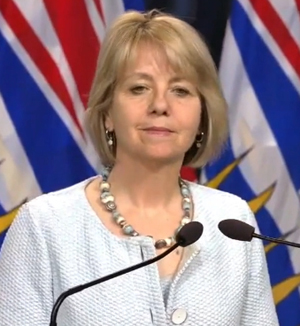
The phased process takes advantage of the intel of the many economic sectors and somewhat assures buy-in, as the ideas will not be imposed by Dr Henry but will have been generated from within each sector of community, business or industry as the big freeze of social-isolation begins to be thawed.
The process is ideally slow and carefully done. But life is life… with a mind of its own… and it will take — as Health Minister Adrian Dix repeats often — for “everyone to be 100 percent all in” to maintaining that flattened curve (slow rate of COVID-19 infection that does not overwhelm the health care system) in BC.
The new normal is something that will evolve. The pandemic is still active and could get worse if people let up their resolve to physically distance and self-isolate. People still get sick from COVID-19 every day, impacts on the economy have been massive, and the aftermath of mental health responses (due to emotional, social and financial loss and crises) over months and years to come will have indelible impacts.
Provincial Health Officer Dr Bonnie Henry refers to the province-wide experience of dealing with the novel coronavirus called COVID-19 as “our pandemic” — the way she and the government want to deal with the situation in this province.
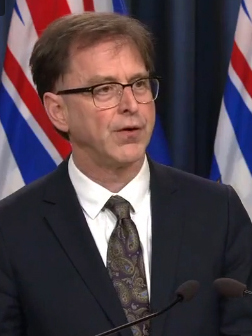
BC has clearly come out ahead of most other jurisdictions in Canada if not the world in terms of containing the spread of COVID-19 infection. That’s if you look at the overall total numbers compared to other provinces and countries.
It does mean that British Columbians have — for the most part – been “all in” to the commitment to self-isolate and practice physical distancing, in addition to the other standard good hygiene measures of washing one’s hands and sneezing away from others or into a tissue or sleeve. The new mantra for all of us is “to stay home if you’re ill”.


